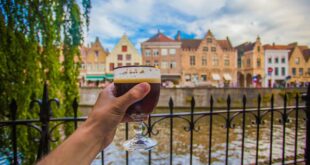[ad_1]
MUNICH – When you think back on a recent vacation, you might recall a certain scent affiliated with your trip – the salty smell of the breeze coming off the sea, the earthly fragrance of freshly-mown alpine meadows, or the divine whiffs of your favorite regional dish. Smell is, after all, one of the most powerful senses, closely linked to memory. Sometimes, you’ll find that it’s the scent particular to your temporary holiday home that you remember. With spring cleaning in mind, Holidu, the search engine for vacation rentals, researched the special cleaning agents that are used in rentals across Europe. As summer fast approaches, find out what your future vacation homes might smell like – depending on popular cleaning products within a region.
Lemon or chlorine: How does Europe clean?
For people in many southern European countries, like Spain and Italy, the house has to smell like a swimming pool for its inhabitants to consider it “clean.” In these regions, you’ll find that people prefer to buy detergents containing chlorine. Only then are Southern Europeans convinced that a home was thoroughly scrubbed.
In France and Belgium, lavender scents are very popular. Since time immemorial, it seems, people in these countries have used the plant as a remedy and bath additive. Its importance in bathing culture explains how the plant got its name: The word “lavender” comes from the Latin word “lavare,” which means “to wash.”
In Scandinavia, less is more – even when it comes to cleaning agents. On the one hand, Northern Europeans have a particularly strong ecological awareness. On the other hand, the water in the region is quite soft, so less chemicals are required. A study by a detergent manufacturer has shown that Scandinavians consider odorless surfaces to be cleaner than if they smelled of pungent cleaning solutions.
Even though Norway and Portugal are more than 1,700 miles apart, there are olfactory parallels between the countries: household cleaners in these nations often smell like spruce or pine needles.
Germans and Austrians associate citrus-smelling surfaces as clean and fresh. Lemon-, grapefruit-, lime- and orange-scented products are by far the best-selling cleaning agents, confirms German chemical and consumer goods company Henkel.
Where might you smell dogs and cigarettes?
Tourists can breathe easy knowing that smoking is allowed in very few homes. In the United States, Canada, the United Kingdom, Belgium and Austria, smoking is permitted in only one percent of total accommodations. Germany follows with two percent, and the Netherlands, with just three percent. Somewhat more tolerant are countries like France, Italy and Portugal, with seven percent, and Spain, with nine percent. If you don’t want to give up smoking in your holiday home, you’re most likely to get your money’s worth in Croatia – smoking is permitted in 12 percent of rentals.
The smell situation is a bit different in holiday homes where pets are allowed. Sure, not all dogs omit strong smells, but if you want to be on the safe side, you can specifically book an accommodation in which dogs are prohibited.
More attention should be paid by the odour-sensitive holidaymakers heading to Austria and Germany: Four-legged guests are welcome in over 40 percent of accommodations. In Italy, the Netherlands, Croatia, France and Belgium, pet-friendly rentals account for about one-third of the accommodations. Southern Europeans are not the biggest dog or pet fans: in Spain, 22 percent of holiday homes and apartments are suitable for people with pets; in Portugal, only 15 percent are available.
Holidu founder and CEO Johannes Siebers explains: “Holiday home cleanliness is truly one of the most important factors. Almost 98 percent of all reviews that aggregate Holidu as a search engine across the various booking portals assess the neatness and cleanliness of an accommodation.”
[ad_2]You can read more of the news on source
 Travelsmart
Travelsmart



